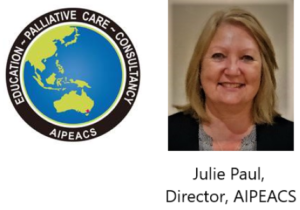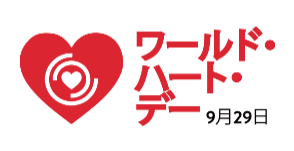
-
日本語訳 監修 木下佳代子 ジェックス参与
今月、9月29日はワールド・ハート・デー(世界心臓デー)の記念日です。
心血管疾患は依然として世界で第1位の死因であり、年間1,860万人が亡くなっています。 (世界心臓連合、2021年)
今年のテーマは、「心でつながる」です。

世界心臓連合のウェブサイトには次のように書かれています。:
「USE HEART❤ TO CONNECT(心でつながる)とは、あなたの知識、思いやり、影響力を利用して、あなたやあなたの愛する人、あなたが参加しているコミュニティが、心の健康的な生活を送るための最良のチャンスを得られるようにすることです。それは、私たち自身の心とつながり、私たちができる限り彼らに刺激を与え続け、育んでいくことを確認し、デジタルの力を使って、あらゆる場所ですべての心をつなぐことです。」( 世界心臓連合)
今年のテーマの概要を紹介したショートビデオをご覧ください。
https://world-heart-federation.org/world-heart-day/get-involved/
世界心臓連合では、さまざまな資料を提供しています。
ワールド・ハート・デーの小冊子・説明書の日本語訳版は、以下のリンクからダウンロードできます。
https://world-heart-federation.org/world-heart-day/resource/whd-leaflet-japanese/
次のリンクでは、あなたの活動を公表したり、他の組織が世界各地でワールド・ハート・デーを記念してどのような活動をしているかを確認することができます。
https://world-heart-federation.org/world-heart-day/whd-stories/
また、今回の更新では、末期心不全患に対する緩和ケアの改善の必要性について考えてみたいと思います。
心不全は死亡率が高いことがわかっています。心不全の進行は予測不可能であり、終末期のケアについて話し合うタイミングを見計らうことが困難です。つまり、患者さんは自分の病気の経過や予後について理解していない可能性があります。 そのため、できるだけ早い段階で患者さんの選択肢について話し合い、患者さんが自分の望む治療、望まない治療、そして人生の終わりにどこでケアを受けたいかを考える時間を確保することが重要になります。
このような患者さんには、緩和ケアについてタイミングよく紹介されないことが多く、全く紹介されないこともあります。また、そのような方々は症状が重く、生活の質に影響を与えていることがわかっています。一般的な症状としては、呼吸困難、末梢性浮腫、痛みや不快感、吐き気や嘔吐、便秘、食欲不振、不安、気分の落ち込みなどがあります。
緩和ケアでは、患者さんが希望するケアの場所や死についての話し合いを含む事前のケアプランの作成、症状管理の改善、終末期の苦痛を伴うショックを防ぐために植え込み型除細動器が装着されている場合は、その計画策定のサポートをすることを目標としています。そして重要なことは、すべての話し合いと決定に、可能な限り患者さんとその家族に参加してもらうことです。- お役に立ちそうな資料は以下の通りです。
●イギリスの資料:難しい会話 – 心不全の人と終末期について話す
https://www.bhf.org.uk/informationsupport/publications/living-with-a-heart-condition/difficult-conversations—talking-to-people-with-heart-failure-about-the-end-of-life
●英国国立医療技術評価機構、 成人の慢性心不全:診断と管理(緩和ケアの項目を含む)- https://www.nice.org.uk/guidance/ng106
- ●論文:日本における末期心不全の緩和ケアに関する全国調査の構想(2017年発行、Journal of Cardiology全文)
- https://www.journal-of-cardiology.com/article/S0914-5087(17)30196-X/fulltext
●論文:日本における心不全患者のアドバンス・ケア・プランニングに関する医師・看護師の認識 (2020年7月発行)
https://apm.amegroups.com/article/view/44809/html
- https://www.journal-of-cardiology.com/article/S0914-5087(17)30196-X/fulltext
- 追加情報を希望される分野がありましたら、ご要望を julie@palliativeeducation.com までご連絡ください(英語でも日本語でも可)。 緩和ケアに関する皆様のご意見やご経験を共有することで、お互いに学び合うことができますので、皆様のご様子をお聞かせください。
パンデミックの間、どうか安全にお過ごしください。 来月の報告の機会を楽しみにしています。
ごきげんよう、ジュリー
[事務局より]
直接、ジュリーさんにメールを出しにくい場合は、遠慮なくジェックス事務局(nurse@jeccs.org ) まで、日本語でご連絡ください。感想、質問などをお待ちしています。
Disclaimer: September 2021 免責条項:
Australian International Palliative Education and Consultancy Services (AIPEACS) は、Julie’s Corner シリーズ内の内容につき正確な情報の提供に細心の注意を注いでいますが、特にある事柄についての専門的意見を提供するものではありません。このシリーズに含まれる情報は、独立した専門家の見解に取って代るものではありません。また、医療上の助言として利用したり、何らかの疾患の治療、手当、又は、予防のために使用されるものではありません。
AIPEACSは、このシリーズにより提供される情報の利用、依存によるいかなる法的責任、怪我、紛失、損害については、責任は負いません 。
Australian International Palliative Education and Consultancy Services Pty. Ltd
Julie’s Corner: September 2021 (原文)
This month we celebrate World Heart Day on the 29 September. Cardiovascular disease remains the world’s number one killer, resulting in 18.6 million deaths per year. (world heart federation, 2021). This years theme focusing on using the heart to connect.- As stated on the World Heart Federation web site:
“USE HEART TO CONNECT is about using your knowledge, compassion and influence to make sure you, your loved ones and the communities you’re part of have the best chance to live heart-healthy lives. It’s about connecting with our own hearts, making sure we’re fuelling and nurturing them as best we can, and using the power of digital to connect every heart, everywhere.” ( World Heart Federation)
Here is a short video that provides an overview of this years theme: https://world-heart-federation.org/world-heart-day/get-involved/.
Please refer to the world heart federation for a number of different resources. The World Heart day leaflet has been translated into Japanese using the following link to download a copy: https://world-heart-federation.org/world-heart-day/resource/whd-leaflet-japanese/.
You can use the following link to publicise your activities and to see what other organisations may be doing across the world to celebrate World Heart Day: : https://world-heart-federation.org/world-heart-day/whd-stories/.
I would also like to use this update to reflect on the need for improved palliative care for patients with end stay heart failure. We know there is a high mortality rate in heart failure. The progression of heart failure can be unpredicabile which can make it difficult to know when to have conversations about end of life care. This means patients may be less likely to have an understanding of their disease trajectory and prognosis. Based on this it is important to discuss patients options early as possible to enable patients time to think about the treatment they would or would not want and where they want to be care for towards the end of their life.
These patients are often not referred to palliative care in a timely manner or even at all. We know that these patients experience significant symptom burden often impacting on their quality of life. Common symptoms include breathlessness, peripheral oedema, pain and discomfort, nausea and vomitting, consitpation, anorexia and anxiety, low mood/ depression.
Goals of care for palliative care include support to completed an advance care plan including discussions about their preferred place of care and death, improved symptom management, developing a plan in relation to their implantable cardioverter defibirillator if in situ to prevent distressing shocks at end of life, and importantly involving the patient and their family where possible in all of the discussions and decisions.
Useful resources include:
UK resource: Difficult Conversations – talking to people with heart failure about end of life
https://www.bhf.org.uk/informationsupport/publications/living-with-a-heart-condition/difficult-conversations—talking-to-people-with-heart-failure-about-the-end-of-life
National Institute for Health and Care Excelence, UK, Chronic heart failure in adults: diagnosis and management ( includes section on palliative care) https://www.nice.org.uk/guidance/ng106
Article: Design of a nationwide survey on palliative care for end stage heart failure in Japan, published 2017, full text Journal of Cardiology, https://www.journal-of-cardiology.com/article/S0914-5087(17)30196-X/fulltext
Article: Perceptions of physicians and nurses concerning advance care planning for patients with heart failure in Japan, July 2020 https://apm.amegroups.com/article/view/44809/html
If you have any particular areas you would like additional information on, please forward your request (either in English or Japanese) to julie@palliativeeducation.com and we will ensure this is discussed. Don’t forget to let me know how you are going, as we enjoy sharing your thoughts and experiences in palliative care, so we can continue to learn from each other.
Please stay safe during the pandemic. I am looking forward to our next month’s catch up.
Take care, Julie
